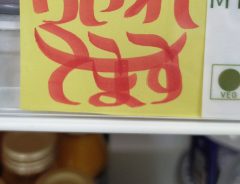
Source: Purana | © PIXTA (no swimsuits or humans were harmed in the making of this photograph)
Sukumizuage: Okinawa fishing news wording leads to humorous misunderstanding online
- Source:
- mits | © PIXTA
- Tags:
- fishing / Fried food / Japanese language / Ōjima Island / Okinawa / Ryūkyū Shimpō / School Uniform / suku
Related Article
-

Fashion and manga fans! Learn Japanese with hilarious songs by a popular Japanese band
-

Large, green amphibious centipede is first of its genus to be discovered by Japanese scientists
-

Tokyo grocery’s signs look like Hindi to shoppers even though they’re in Japanese
-

Useful in Japan: Four versatile Japanese expressions with a total of 28 meanings!
-

Japanese Public Elementary School Adopts Armani-Designed Uniform, Tripling Price
-

Awesome 360° Panorama Tour Site Lets You Explore Some Of Japan’s Most Gorgeous Areas In Style


A headline from the Ryūkyū Shimpō, Okinawa's top newspaper, has gone viral on Twitter today due to a possible interpretation of the wording.
The headline 「スク水揚げ、シマに活気 南城市奥武島」, meaning "Suku unloaded, bringing vitality to Ōjima Island, Nanjō City" describes one of the highlights of summer for this Okinawan island, in which suku スク, the local name for juvenile pinspotted spinefoot (Siganus fuscescens), are unloaded from fishing boats. The fish are a delicacy in Okinawan cuisine, often salted (known as スクガラス sukugarasu), served as snacks to go with alcohol, and most famously appearing on top of tofu, in a local specialty called スクガラス豆腐 sukugarasu tofu, as you can see below:
chichacha | © Flickr.com (CC by SA 2.0)
Here is a video Ryūkyū Shimpō uploaded to their official YouTube channel showing suku being unloaded in the summer of 2018:
Syntactic ambiguity
So far so good. Nothing particularly odd or humorous seems to be going on.
But this is where the structure of the Japanese language opens up possibilities for another interpretation.
Depending on how you parse it, the combination of characters スク水揚げ sukumizuage can be interpreted as スク suku (the fish), 水揚げ mizuage (unloaded), but it can also be interpreted as スク水 sukumizu, an abbreviation of スクール水着 sukūru mizugi, meaning "school swimsuit," in reference to the typically blue or navy-colored swimsuits required by some Japanese schools to wear during swimming lessons, and 揚げ age, a noun meaning "fried (food)."
The term sukumizu is, for better or worse, known within manga and anime fandom and is generally familiar to many Japanese people as a meme. Therefore, while Okinawans may first think of fish being unloaded when they see this combination of characters, the majority of Japanese Twitter users couldn't help seeing the other interpretation.
Very soon, images of school uniforms being fried and other images inspired by the idea began popping up on Twitter:
"When I saw 'sukumizuage' trending on Twitter, this is what I thought it was!!!"
"I wonder how many people seeing the character combination スク水揚げ (sukumizuage) were able to correctly interpret it as スク、水揚げ (suku, mizuage)"
And, of course, illustrators didn't pass up on the opportunity either:
Snacking on sukugarasu with a glass of Awamori on the side sounds good.
If you live in Japan, many Okinawan restaurants will carry it, and you can also buy them in jars from online retailers like this one.